Learning, Independence, Needs and Care
Overview
LINC provides a bridge between school and the world the adult learner will transition into. We plan carefully with parents, carers and other professionals and take into account the learner’s voice in preparing suitable provision.
Our broad curriculum is designed to provide learners with a range of experiences and skills to help them transition into a fulfilled and more independent adult life.
Our adult provision is aimed at learners with profound and multiple learning difficulties (PMLD) or those with severe learning difficulties (SLD). Learners will require a high level of adult support for their learning, communication and personal care and health needs.
Our Blue Pathway is designed for learners with very complex needs who require a highly sensory-based curriculum. Learners on this pathway work on engagement, reactions, and early communication, as well as developing movements in a very individualised way. They are supported to respond to their environment and the people within it, and to begin being more proactive in their movements and responses.
Our Green Pathway supports learners who require additional help with communication, coordination, self-help skills, and cognition. While it follows the same core areas as the Blue Pathway, it moves away from a predominantly sensory focus. Learners on this pathway develop their independence through personalised teaching that builds their communication, everyday living skills, and ability to interact with others. The curriculum is designed to help them make choices, practise problem-solving, and develop the skills they need for greater autonomy in their daily lives.
Progress across both Pathways is assessed against:
- personalised EHCP outcomes
- Blue or Green Pathway targets
- the Engagement Model
In addition, learners on both Pathways have the opportunity to work towards ASDAN accreditations through the Lifeskills Challenges.
Admissions
Placements are for a maximum of two years. We have 8 spaces each year and we prioritise places for those with the highest level of need.
Admissions to LINC are largely the same as the main school in that paperwork requesting consideration of a place comes from the Statutory Assessment Team at the relevant Local Authority. If we agree that LINC might be appropriate, the learner is invited in with their parent or carer. If there is a place available and the needs of the learner can be met, we can offer a place subject to funding being agreed with the Local Authority.
A day in LINC
.png)
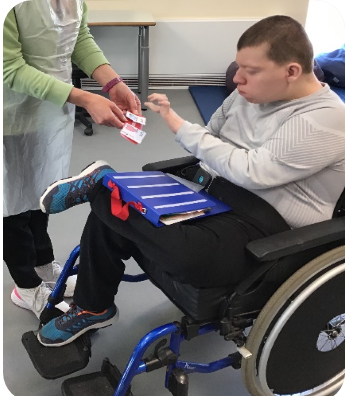
Clothing
- LINC students do not have a uniform and should attend in comfortable clothing appropriate for a range of activities, some of which may be PE-based.
Food at LINC
- We appreciate that our students’ wide ranging needs mean that some of them will only eat a restricted diet. That said, please try to keep any snacks or packed lunches as healthy as possible.
- We are a nut free school. Please check that anything you send in is nut free.
- School meals - most of our adult learners supply their own packed lunch, but sometimes our students are supported to cook their lunch on site.
Free school meals - If your son/daughter is eligible for free school meals this will be provided. Check if you are eligible for free school meals by visiting Cambridgeshire County Council website at: https://www.cambridgeshire.gov.uk/ and searching “free school meals”.
Transport
- Many of our learners travel to and from LINC on taxis or mini buses. However, if you live within a certain distance from Highfield you may not be eligible. Please see the County Council website for further information.
Assessment
- All learners are assessed informally during their first few weeks with us. Progress is measured from this baseline point. Account is taken of previous assessments and information from any previous setting
- At the annual review the individual’s learning and developmental priorities are agreed, forming their EHCP “Outcomes” (targets). Parents/carers, learners, teachers and other professionals work together deciding what are the focus areas for the coming year, and this forms the basis of addressing each learner’s additional needs.
- Learners are assessed against progress towards their EHCP Outcomes and their Pathway framework
Reporting
- Parents’ and Carers’ Evenings – We hold two evenings, one each in the Autumn and Summer terms. The focus for the autumn evening is to discuss how your son/daughter is settling in and what we plan to work on throughout the year . The summer one is to feedback progress and discuss the next steps in your son or daughter’s learning.
- Annual reviews – A meeting is held annually when each learner’s EHC Plan is reviewed. Parents and professionals are invited. This is part of the statutory process for learners who have an Education, Health and Care Plan
- Evidence for Learning—this software allows us to regularly share your son/daughter’s progress with you in real time. Once you have signed up you will receive a notification each time a piece of evidence is uploaded by the teacher. You can also upload your own evidence of progress if you wish.
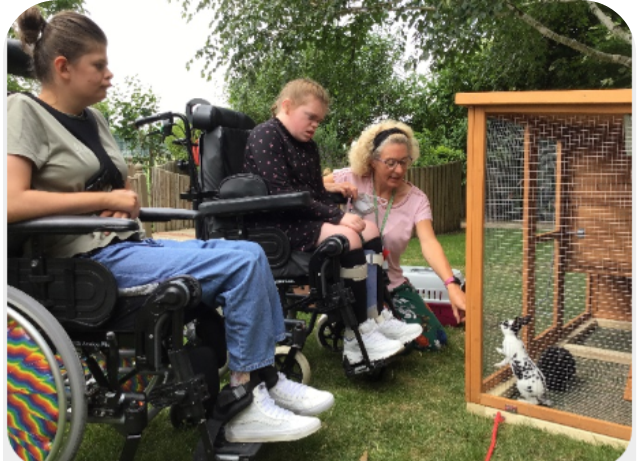
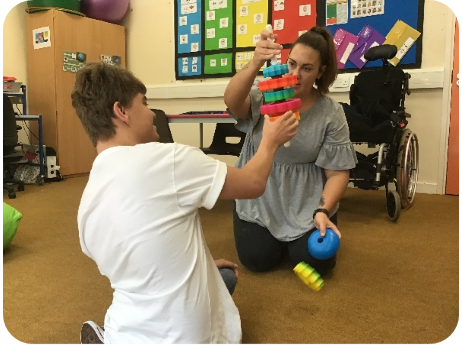
Adult safeguarding
- We recognise that our young people are among the most vulnerable and, as such, take their safeguarding and protection extremely seriously.
- We have six “Designated people” (DP’s) for Safeguarding at Highfield Ely. These are the Department Leaders and the Headteacher. One of these is based full time in LINC. All staff are regularly trained in Safeguarding procedures and we have an ethos of “it could happen here” so that nobody becomes complacent.
- LINC staff have additional training specific to safeguarding adult learners.
- Our Health and Safety committee meets regularly to ensure that the school environment remains a safe, pleasant place to be.
- Please do not hesitate to contact the Headteacher if you have any concerns around safeguarding.
Home/school communication
- Parents and carers are always very welcome in LINC. We maintain close links and are willing to discuss a learner’s progress and any concerns formally or informally at any mutually convenient time.
- Regular meetings are planned to give parents and carers the opportunity to consult staff about their son/daughter’s progress. The annual review of the EHC Plan is an important meeting for staff, parents, learners and other professionals when progress is assessed and new priorities are planned for the forthcoming year.
- We use an email system for sending home letters and information from the office. Parents are encouraged to set this up when their son/daughter joins LINC. Teachers or office staff will also phone if a conversation is ever needed. Parents and carers are encouraged to keep up a good level of communication with the school.
- For day to day home/school communication we use ‘Class Dojo’. This allows parents and carers to see what we’ve been doing in school and to pass on important information. We value good communication, so if you ever think there’s not enough, please don’t hesitate to speak to your son/daughter’s teacher or the LINC Leader.
Curriculum
Our curriculum focuses on the skills our students will need to successfully make the next steps into their adult placements, bridging the gap between education and social care. We integrate life skills, independence and personal development through daily sessions.
Our Blue Pathway uses engaging activities such as music, sensory stories and careers sessions in a sensory format and various other interventions to develop early skills. Core subjects taught in the main body of the school are weaved into these sessions - for example, maths through cooking, early reading skills through sensory stories, science through music and geography through community outings. In addition, areas such as independence, healthy living and social skills are developed through PSHEE sessions, self care, community visits and various physical sessions.
In our Green Pathway, skills are also taught through engaging sessions such as cooking, community outings and physical activities, but they are also taught in discreet sessions for some subjects, such as science and maths. Independence skills are woven through sessions - such as recycling, making healthy snacks and following instructions in a range of contexts.
Topics are used to create a different focus for the skills being worked on and to maximise engagement and enjoyment. Through these topics we look at different cultures and different aspects of life. Topics are in a rolling cycle to avoid repetition. Examples of our topics include: India; Food; Celebrations; Africa; Environment; Animals and Italy.
The Blue and Green Pathways are divided into 6 broad areas:
My Communication
Responsiveness, interaction, intentional communication, preferences and rejection, choice making.
My Body
Physiotherapy, fine and gross motor skills, whole body awareness, hydrotherapy, rebound therapy, tac pac, use of the gym.
My Thinking
Anticipation, exploration, contingency awareness, object permanence, attention building, problem solving.
My Independence
Personal care and health, self care skills, safe transfers and travel, encountering life skills and associated job skills, supported transitions to new settings.
My Social Development
Shared attention, the encounter of play skills through interactions, encounter and explore toys or motivating objects, social skills, tolerance of others, turn taking.
My World
Out and about in the local community, special dates and events, trips and visits, residential trips, environmental communication, special guests, outdoor learning.
LINC Curriculum Plans
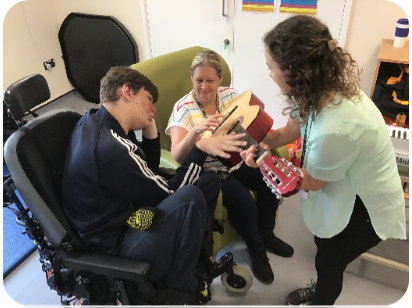
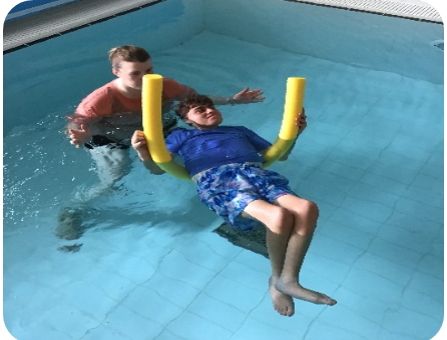
Therapies and interventions
Learners at LINC have access to a wide variety of therapies and interventions appropriate to their learning goals and needs. Some of these are:
Hydrotherapy
An aquatic therapy designed specifically to support a pupil’s physiotherapy needs. We have a heated hydrotherapy pool onsite. Hydrotherapy has proven to improve quality of life for pupils with respiratory conditions.
Whole body awareness
This is a technique which helps students understand their own bodies and themselves in relation to others and wider contexts. Whole body awareness helps to develop self-awareness and promotes well-being.
Tac Pac
This a sensory communication resource using touch and music to help develop communication and social skills.
Intensive interaction
One to one interaction between learner and an attentive adult whereby the adult copies the sounds and movements of the learner. This encourages communication and shared attention.
Music Therapy
Music therapy utilises different musical styles, methods and instruments and allows learners to express themselves and engage with the outside world in a unique musical language. Learners access music therapy on a 1:1 basis or in small groups.
Rebound therapy
An exercise therapy, which uses trampolines to provide opportunities for movement, therapeutic exercise and recreation in addition to helping develop communication and social skills.
Attention Autism
This is an intervention model designed by Gina Davies, Specialist Speech and Language Therapist. It aims to develop natural and spontaneous communication with visually based and highly motivating activities. It also provides opportunities for helping learners to understand transitions.
AAC – Augmentative and Alternative Communication
This encompasses Makaton, PECS, Communication books, visual supports, the use of switches, timetables and social stories. We aim to have total communication classrooms.
Progression
Progression in LINC varies from learner to learner and our highly individualised curriculum is designed to support and reflect this.
Some of our learners will be making small steps through their Pathway, developing skills along the way. Others will be focusing on maintaining skills from previous years of learning.
All learners in LINC will be assessed against:
- their individual EHCP outcomes, designed specifically for the individual learner and their specific needs
- their Pathway curriculum
- the Engagement Model (Initiation; Persistence; Exploration; Anticipation; Exploration)
Qualifications
Learners at LINC have the opportunity to gain accreditations in ASDAN Lifeskills. Learners can undertake individual qualifications from a whole suite of “Lifeskills Challenges”. These include engaging topics ranging from Hydrotherapy skills to Gardening. All learners will work towards completing one Lifeskills Challenge each year.
Next steps
Transition is a huge focus in LINC and learners successfully move on to a range of settings, including supported living, day centres and other social care settings.
Impact
We keep in touch with former learners and their families long after they have moved on. We know through conversations with parents and carers that LINC helps our young adult learners grow in confidence, more effectively communicate their wishes and feelings, become more independent and become more willing to access a broader range of the opportunities available to them. The progress they make in LINC allows them to get the most out of life in the adult world they are entering into.
Please contact the Headteacher on 01353 662085 if you have any questions regarding LINC